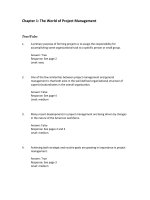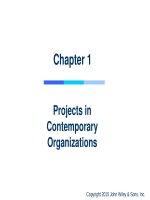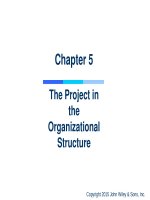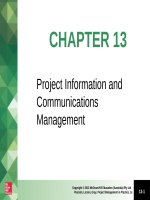Lecture Project management in practice (Fifth Edition) – Chapter 2: The manager, the organization, and the team
Bạn đang xem bản rút gọn của tài liệu. Xem và tải ngay bản đầy đủ của tài liệu tại đây (641.04 KB, 42 trang )
Project Management in Practice
Fifth Edition
Chapter 2
The Manager, the
Organization,
and the Team
Copyright © 2014 John Wiley & Sons, Inc.
11
Introduction
•
•
•
•
Project manager usually selected after project is
selected
It is job of project manager to make sure that the
project is properly planned, implemented, and
completed
Project manager then recruits qualified people for
the project
Learning project tools and techniques is easy,
succeeding as a project manager is hard
12
The Project Manager’s Roles
•
Facilitator
–
Facilitator versus supervisor
•
–
Systems approach
•
•
Must ensure that those working on project have the
appropriate knowledge, resources, and time to accomplish
their responsibilities
Must understand how everything impacts the overall project
Communicator
–
Must communicate effectively with the various
stakeholders of the project
13
Communication Paths for a Project
Manager
Figure 21
14
Virtual Project Manager
•
More and more often, project teams are
geographically dispersed
–
–
•
Often referred to as “virtual projects
Much of the communication is conducted via
email, through websites, by telephone, or video
conferencing
To succeed, communication between
project manager and project team must be
frequent, open, and twoway
15
Responsibility to Senior
Management
•
•
Must keep senior management up to date on
the state of the project
Particularly important to keep management
informed of any problems
–
•
Or any likely to affect the project in the future
Never let the boss be surprised
16
Responsibility to the Client
•
•
The project manager is also responsible to the
client
Clients often want changes to the project
–
–
•
Cost, schedule, scope change
Cost of changes often exceed client’s expectations
Project manager must be certain the client
understands the impact of the changes on the
project’s goals of delivery time, cost, and scope
17
Responsibility to Project Team
•
•
•
Facilitate the work of the team
Help the team succeed
Serve as advisor, counselor, confessor, and
interested friend
18
The Project Manager’s
Responsibilities to the Project
•
Acquiring resources
–
–
•
It is the project manager’s responsibility to ensure the
project has the appropriate level of resources
This is especially difficult with human resources
Fighting fires and obstacles
–
–
Early obstacles linked to need for resources
Later fires associated with technical problems, supplier
problems, and client problems
19
The Project Manager’s
Responsibilities to the Project Continued
•
Leadership and making tradeoffs
–
–
–
•
Tradeoffs are between cost, schedule, scope, and risk
Scope is usually the most important
Another type of tradeoff occurs between projects
Negotiation, conflict resolution, and persuasion
–
–
Cannot meet these responsibilities without being a
skilled negotiator and resolver of conflict
Success depends on the project manager’s skill at
persuading others to accept the project
•
As well as changes in its methods and scope once it has been
accepted
110
Skills of Persuasion
•
•
•
•
Effective persuaders must be credible to those
they are trying to persuade
Effective persuaders must find goals held in
common with those being persuaded
Effective persuaders must use “vivid” language
and compelling evidence
Effective persuaders must connect with the
emotions of those they are trying to persuade
111
Selection of a Project Manager
•
Credibility
1.
2.
•
•
Technical credibility
Administrative credibility
Sensitivity to political issues and interpersonal
conflict
Leadership, style, and ethics
–.
–.
–.
Only project manager has the view of the entire
project to provide the necessary leadership
Most effective overall style is participative
Another aspect of leadership is a strong sense of
ethics
112
Growing Importance of
Multicultural Projects
•
•
•
•
Project managers have to be aware of
cultural differences between counties
Common practice in one country may be
illegal in another
Discovering another culture’s ethical
standards is difficult
Project managers have to be trained to the
highest ethical standards
113
Project Management As A
Profession
•
•
•
•
Project management is a demanding job
Mastering the use of project management
tools requires specialized knowledge
Project Management Institute (PMI) is a
projectoriented organization with more
than 300,000 members worldwide
PMI publishes The Project Management
Body of Knowledge (PMBOK)
114
Career Path for the Project Manager
•
•
•
•
•
•
Starts with work (not as manager) on a
small project
Moves on to larger projects
Moves on to a project engineer or deputy
project manager
Project manager for a small project
Moves on to larger projects
May manage a “megaproject”
115
Fitting Projects into the Parent
Organization
•
•
•
•
Project managers rarely have any influence
over the interface between the project and
the parent organization
This is a matter of company policy
As such, it is decided by senior
management
However, it has a major impact on the
project manger
116
More on “Why Projects?”
•
•
•
•
•
Emphasis on timetomarket
Need for specialized knowledge from a
variety of areas
Explosive rate of technological change
Need for accountability and control
Rapid growth of globalized industry
117
Pure Project Organization
Figure 22
118
Pure Project Advantages
•
•
•
•
Effective and efficient for large projects
Resources available as needed
Broad range of specialists
Short lines of communication
119
Pure Project Disadvantages
•
•
•
•
Expensive for small projects
Specialists may have limited technological
depth
May require high levels of duplication for
certain specialties
The project begins to take on a life of its
own
120
Functional Project Organization
Figure 23
121
Functional Project Advantages
•
•
•
Has immediate, direct, and complete
contact with the most important
technologies it may need
Fractional resource problem is minimized
Projectitis will be minimal
122
Functional Project Disadvantages
•
•
•
Lines of communication outside functional
department can be slow
Technological breadth can be missing
Project rarely given high priority
123
Matrix Project Organization
Figure 24
124
Matrix Project Advantages
•
•
•
•
Flexibility in way it can interface with
parent organization
Strong focus on the project itself
Contact with functional groups minimizes
projectitis
Ability to manage fundamental tradeoffs
across several projects
125









